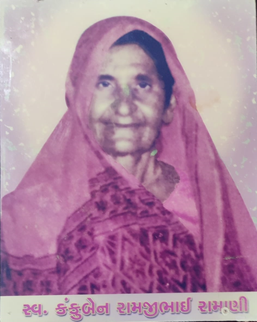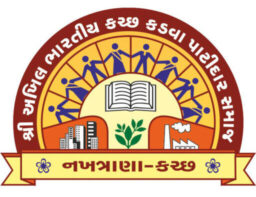 Venerable elder Shri Naran Ramji Limbani and his 6 friends performed ablution (Dehshuddhi) on the banks of the Godavari river at Nashik in 1908. They renounced Khichdia Satpanth, adopted pure Vedic Sanatan Dharma and launched a Sanatan Dharma campaign against Satpanth.
Venerable elder Shri Naran Ramji Limbani and his 6 friends performed ablution (Dehshuddhi) on the banks of the Godavari river at Nashik in 1908. They renounced Khichdia Satpanth, adopted pure Vedic Sanatan Dharma and launched a Sanatan Dharma campaign against Satpanth.
On Samvat 1979, Jeth Sud-5 dated 20-5-1923, a total of 161 people of Dayapar village underwent purification in the presence of Naran Ramji, eliminated the torture of the oppressors, renounced Khichdia Pirana Satpanth and took initiation into pure Vedic religion. Due to the unprecedented event of the Sanat awakening in Dayapar village, an extraordinary agitation against Satpanth also started in the surrounding villages. Youths and female members of the community also started joining in this struggle. Many community sisters started the Dharma awareness movement in their homes and at their in-laws.
The Sanat movement first began in Paneli village. After the people of Dayapar had already purified themselves, the people of Paneli village were eager to leave Satpanth and follow the pure Vedic religion as soon as possible. They didn’t want to wait any longer. Their patience had run out. Finally, on the holy day of Samvat 1979, Aso Sud-10 (Vijaya Tenth) dated 18-10-1923, 16 families and 67 people from Paneli village embraced the pure Vedic Sanatan Dharma. They did this after purifying themselves under the guidance of Maharaj Shri Mani Shankar Ambalal Tripathi from Dayapar.
After the 67 people from Paneli village underwent purification, there was confusion and disturbance in the nearby villages and among the Satpanthi Gedheras. They were getting ready to respond with even greater force. On one side, there was the entire Satpanthi community, and on the other side, there were only a few Sanat brothers. It was a challenging situation. The Satpanth leaders and troublemakers started to mistreat them. They began making threats and causing trouble. However, these 67 people were so deeply committed to Sanatan Dharma that they firmly told the Gedheras that no matter how much they were tortured, they would not abandon Sanatan Dharma.
The incident in Paneli village caused a lot of disturbance in the nearby village of Valka Mota. In Valka village, the head farmer was Jivraj Pokar. Kankubai, a farmer’s daughter, had married Patel Ramji Raja Nathani from Paneli village. Kankubai’s father was the village leader. Despite being Mukhi’s daughter, Kankubai stayed with her husband and abandoned the heretical Pirana Satpanth to embrace the pure Vedic religion. This decision led to criticism from Kheta Mukhi’s followers.
They warned that if the daughter of Khana’s chief joined the reformers, she and her descendants for twenty-one generations would go to Dozakh (Hell). To explain this, the farmer advised Kankubai to talk to her daughter and offered assistance, including providing food, if needed, to support her in this endeavor.
Upon hearing such statements, Kheta Mukhi became even more deeply entrenched in religious extremism. They called Kankubai and tried to explain their perspective. Despite numerous attempts to persuade her, Kankubai remained steadfast in her beliefs. Eventually, Kankubai began to face intimidation, threats, and even physical torture. However, she remained resolute in her stance.
Kankubai made it clear to her father, Kheta Mukhi, that she would continue to live with her husband, following the pure and eternal religion. She declared that no amount of torture or harm inflicted upon her would make her return to their sinful cult. She firmly stated that her determination was unshakable, even if the impossible happened, and the sky merged with the abyss. Kankubai’s unwavering resolve posed a formidable challenge to the strength of the wicked Pirana cult.
In the end, Kankubai’s father, Kheta Mukhi, felt powerless and declared his daughter and son-in-law as dead. He symbolically bathed their names off their faces and reclaimed the dowries he had given to Kankubai. In response, Kankubai not only returned the embroidered items but also the clothes that had been given to her. She offered, “If these don’t satisfy you, I am wearing the clothes you provided right now, and I’ll return them to you immediately.”
Kankubai then discarded the clothes she was wearing, proclaiming that the water in her father’s house was now forbidden for her. With tears in her eyes, she severed all ties with her relatives for the sake of the sacred Vedic Sanatan Dharma. Kankubai’s courageous and bold actions in a tragic situation are commendable. Only a poet’s pen can truly capture the sacrifices made by these dedicated Sannaris for the Vedic religion.
Many revolutionary and brave sisters have sacrificed their lives in the Sanat movement led by Pujya Naran Ramji Limbani. It is important for today’s generation to understand their contributions.
The Ramji Raja Nathani family has been residing in Meghpar village since the establishment of Meghpar (T. Lakhpat) village in Samvat 1990, which corresponds to AD 1934. This move happened exactly 10 years after the events in Paneli village. The descendants of this family now live in Kosamba, Gujarat, and they continue to hold a deep affection for Sanatan Dharma to this day.
Reference : Pirana Ni Pol

